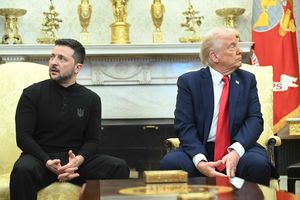Last week’s pub brawl in the White House has made many an old-school diplomat wear a we-told-you smirk. They had been warning against the kind of personal diplomacy that many world leaders are indulging in these days. The brawlers compounded the sin by staging it in public.
First about personal diplomacy. It is that in which heads of states and governments not only meet and mingle in person, but also haggle over matters of trade and truce by themselves, a job traditionally done behind closed doors by professional diplomats. Champions of personal diplomacy say, professional diplomats would get issues entangled in red tape, or locked up in round brackets and square brackets, and would trip over commas, colons and communique prose. Issues can be sorted out better, they say, if the principals develop a personal chemistry between them.
It is generally held that Franklin Roosevelt initiated personal diplomacy in modern times. He got Winston Churchill and Joseph Stalin to meet him a dozen times in less than four years during World War II, at times in such odd places as Malta, Yalta and Casablanca. In the pre-jet age, that must have been some summiteering!
Most US presidents have since been practising it. Jimmy Carter’s personal bonding with Anwar Sadat helped in the Camp David deal between Egypt and Israel. Ron Reagan’s man-to-man dealings with Mikhail Gorbachev helped end the Cold War.
All the same, the Europeans, who thought they were wiser to the world and its bad ways than the upstart Americans, had traditionally abhorred personal diplomacy. Their statesmen used to scrupulously leave dealings with foreign powers to ministers and ambassadors. Even Lord Palmerston, who had achieved name and fame as one of the greatest diplomats of the 19th century, left deal-making with foreign powers to his diplomats after he became prime minister.
So much so, British diplomat Sir Harold Nicolson wrote in 1939 that frequent meetings between world leaders “should not be encouraged”, since “such visits arouse public expectations, lead to misunderstanding and create confusion”. Don't we know how A.B. Vajpayee's Agra summit with Pervez Musharraf had raised hopes to Kargil level and then flopped? The saving grace was that the summit was behind closed doors, but Musharraf spilled all the beans at an infamous breakfast he hosted for the press, leaving Indian diplomats fuming.
The problem with personal diplomacy is that the odium is greater if things go wrong, as it happened last week in the White House. As Dean Acheson, who was Harry Truman’s secretary of state, had cautioned, “when a chief of state or head of government makes a fumble, the goal line is open behind him.”
True! Now the goal line behind Volodymyr Zelensky is open for Vladimir Putin to score goals, unless Zelensky’s European friends jump into the field to guard it. If they do, they might even start a third world war, the very thing Trump was warning Zelensky about.
How? Will tell.
The brawl has left Europe worrying on three counts. One, Trump has stopped funds and firearms to Ukraine, and wouldn’t care if the devil or Putin takes Ukraine. Two, he has told Europe to spend more on guns or go to hell. Three, Trump’s conscience-keeper Elon Musk and others have started saying the US should leave the NATO.
Then what? Forget Ukraine, the entire Europe would be easy pick for Putin, who has more troops than all the NATO armies put together. The only things that might deter him would be Britain’s 225 and France’s 290 atom bombs.
Peanuts! Putin has ten times more.
prasannan@theweek.in


